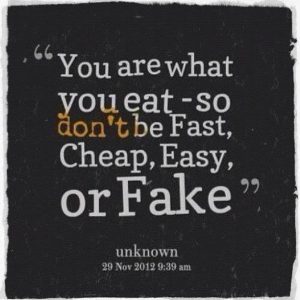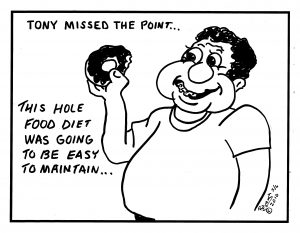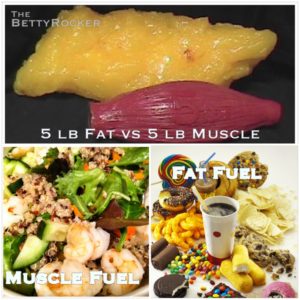
She told me that she got her work at a time in her life when she was really into tattoo subculture, but that some of the ink covered by her clothes was stuff she didn’t care for as much anymore. She said that even though she didn’t regret the bad tattoos, she wouldn’t get them now.
It got me thinking about the different ways we develop our identities, and that those forays into different subcultures leave marks that shape who we become.
Tattoos, hairstyles, fashion – and diets.
How we practice food is just as personal as how we choose our fashion, how we practice our spiritual beliefs, how we choose our pets, and any number of life choices that define who we are.
While getting rid of extra body fat does wonderful things for our long-term health, I am positive that the journey we go on to get there is even more important than the end goal.
Full immersion in a Diet will give you great information about your body, new food ideas and help you develop who you are, but taking it too seriously for too long can be limiting – and detrimental to your health.
What troubles me about “diets as identities” isn’t the foods that many of them include, it’s the foods they EXCLUDE.
Each diet has a particular set of parameters that eliminate or restricts specific foods – some of them healthy, whole foods. Some of the foods that get eliminated contain nutrients you can’t live without for an extended period of time without suffering some consequences in how you feel or function.
For example, quinoa – a seed-like grain – is just bursting with manganese, a nutrient that plays a key role in carbohydrate and fat metabolism, bone health and enzyme function.
Manganese is also found in spelt, brown rice, garbanzo beans, rye, soybeans, oats – and spinach, pineapple and pumpkin seeds.
Imagine if you started following a diet that eliminated all grains and legumes, and you weren’t eating enough, or any other dietary sources of manganese. You might find yourself craving chocolate (which also contains manganese) and wondering why.
Manganese is just one simple example, but the bottom line is this: if you are restricting your consumption of specific whole foods for an extended period of time because your diet says they will make you fat, or they’re somehow bad for you, you might miss the signs your body is sending you that it NEEDS those nutrients.Nutrients it’s not getting from the foods your diet does include.
While the long term effects of nutrient deficiency might not be as visible as a bad tattoo, they can certainly impact your life in a big way.
While I get letters about all kinds of side effects from different diets, one of the most common complaints I hear from people is about their sugar (and sometimes chocolate) cravings.
They tell me that their diet is super clean – that they’ve been counting calories diligently, or following something like paleo, vegan, vegetarian, etc religiously – but they’re struggling with control around sweet stuff. They blame themselves, suffer from negative self-talk, and obsess over every bite, every calorie taken in to the point where food stops becoming a fun, joyful experience and starts to feels like work.

This is not to disparage any of the diets out there. This is a cautionary tale to remind you to listen to your body over listening to a book/show/person.
If you’re a regular reader, you know that I post recipes that fall into a variety of diets like vegan, paleo, vegetarian and raw, and/or are gluten and dairy free. I believe different things work for different people at different times.
I LOVE FOOD, and I love looking into different diets for cooking inspiration.
I want you to think of diets as paint colors on a palette; take a little from each to create great art – and don’t get stuck on one color.
In the “color spectrum” of recipes and foods from the different eating styles I enjoy, there is one common thread that ties them all together that you should consider when it comes to optimal health. That is the NUTRIENT COMBINATION in your meals. Not calories – nutrients – from WHOLE FOODS.
These tips will help keep your blood sugar stable, your muscles fueled, your body in fat-burn mode, and your brain happy:
- Be sure to eat enough variety of simple and complex carbohydrates from whole food sources (not refined) throughout the day, and that your whole grains have been either soaked, sprouted or fermented to ensure some enzymatic breakdown, and optimal absorption and digestion.
- Eat complete protein with every meal.
- Include healthy fats and a variety of greens throughout the day and week.
- Bake your own goodies and treats using recipes that are based on whole foods, not refined or processed ingredients.
- Treat yourself on occasions of your choosing – and notice how much easier it is to enjoy the experience when you don’t feel deprived.
Forget about what diet it comes from and seek out recipes that include the nutrients your body actually needs to function like the high-performance machine it is, sourced from whole foods.
Now, back to those food cravings, because I want to address the many questions I get about them: the body craves sugar and other sweet things for many reasons.
It may be because it needs energy and nutrients that it’s not getting enough of from any of the other foods in your daily intake.
Sugar cravings can also be associated with comfort or emotion, and are often triggered by stress. If you’re trying to follow a specific diet and restricting yourself endlessly, that in itself is a kind of stress.
If you’re eliminating specific foods and not replacing those nutrients in other ways, how can you be sure your body isn’t having cravings to meet that nutrient need?

That’s why what you feed yourself matters so much.
We all know what volume-full feels like – that’s when you’re stuffed. Refined sugar, flour and processed and packaged foods made from them are stripped of many nutrients.
You will struggle to stop eating when you eat that kind of “food” because your body won’t hit the nutrient density meter.
But switch to whole foods in combinations that include the nutrients mentioned above, and you will notice how satisfied you feel after a meal – and throughout the day.
No diet guarantees you’re healthy. No number on the scale, no pant size and nothing anybody else says defines it either. You’re healthy when you feel awesome every day and are the Master of what you take in – not the other way around.
I’m not telling you to stop your diet.
I’m asking you to increase your honest awareness of how the food you eat is making you feel on a regular basis.
Is it working? Do you have stable energy, get hungry a few times a day, enjoy dessert or cocktails occasionally without needing them daily, crush your workouts, have regular B.M.’s (bowel movements), have clear eyes, good-smelling breath and rarely get sick?
Or do you often feel bloated, have gas, get headaches, have bad breath, have irregular B.M.’s, skin breakouts, weight fluctuation, hormone fluctuation, erratic energy and consistent sugar cravings?
You got this amazingly complex machine of a body at birth, and it is its own animal.
You’re subject to things beyond your control like gender, your age at this moment, race, and unique genetic composition that makes you tall, short, big boned, small framed and everything in between.
What you are in control of are the experiments you apply to yourself to determine the optimal fuel for you. Just because a particular diet helped you lose 10 pounds a year ago doesn’t mean you should keep following it if your body is talking to you with any of those signs I mentioned above.
If something isn’t working or doesn’t feel right: adjust, change, keep seeking, keep learning, keep trying.
You can’t get it wrong when you’re eating whole foods and are willing to try a variety of them. This is why I don’t believe there is one perfect diet, and I say different things work for different people at different times.
I like to change things up and check back in with my body every few years to see if it tolerates a food that it used to react poorly to.
Don’t limit yourself, and don’t be afraid to mix things up. Taking out common inflammatory foods, even for a short time can make a big difference in your body’s ability to process nutrients.
Many of my personal recipes are gluten and dairy free, but I go back and forth with those foods in my life because they’re not bad foods – it’s just that eating them constantly and all the time can stress out the body’s processing center.
I also find that it’s not the specific “diet” that makes me (or anyone) successful as it is the SYSTEM we use to nourish ourselves that fits our life – so we can be consistent in our choices and not fall off track because it’s too hard to follow.
“The main “difference” I noticed immediately after starting the Body Fuel System was that I stopped craving sugar all the time. I still would feel a craving every now and then (especially during emotional moments) but because my body was finally “adequately fueled” with complex carbs and proteins and veggies on a regular basis I didn’t feel that desperation for sugar like I used to. I read the Body Fuel System from cover to cover and what I appreciated most was not just the incredible amount of information and advice, but the positive message of self-love and acceptance that Betty Rocker was spreading.
Through her incredible guidance I have learned to love myself and not punish/reward myself with food. Food is my fuel, nothing more, nothing less. Thanks to the nutritional philosophies in the Fuel System I feel as though I finally get it. I don’t feel like I’m on a “diet”. In fact, I feel amazingly nourished all the time! The difference is that since I’m prepping my meals at the beginning of each week/day and actually paying attention to everything that goes into my body, I feel happier and more in control with my life. It has even made me a better friend, team player, sister and teacher. “
-Ashley G.
Like Ashley says, I practice healthy eating as a system – that’s the Body Fuel System – to get a variety of whole foods in my body every day and every week in the most efficient way I can without feeling restricted. Don’t define yourself by your Diet – define your diet as an ever-evolving SYSTEM based on the results you get through self-experimentation, adventurous cooking, and the enjoyment of real, whole food.
